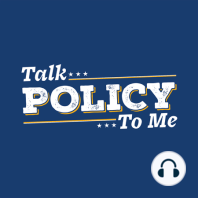19 min listen

Episode 502: Talking Trade-offs and the Electric Grid
Episode 502: Talking Trade-offs and the Electric Grid
ratings:
Length:
24 minutes
Released:
Nov 4, 2021
Format:
Podcast episode
Description
As Congress struggles to pass a spending bill that includes some of the biggest climate legislation the U.S. has seen, there’s another big hurdle the country needs to clear to make big moves on climate change —the electric grid. In this episode, reporter Elena Neale-Sacks talks to energy policy expert Steve Weissman, environmental scientist Grace Wu, and energy equity researcher Daniel Raimi, to better understand how the grid needs to change to better adapt to the effects of climate change and mitigate future effects. Transcript Noah Cole: [00:00:01] Hey, Amy. [00:00:01][0.2] Amy Benziger: [00:00:01] Hey, Noah. [00:00:02][0.1] Noah Cole: [00:00:02] Today we're talking about climate change. [00:00:04][1.4] Amy Benziger: [00:00:05] We have the most progressive president on the environment in decades, but we still can't seem to get anything done on the local or federal level. [00:00:11][6.1] Noah Cole: [00:00:12] It's easy to blame the lack of progress on right wing holdouts in Congress, and that is a big part of the equation. But it's not the focus of today's episode. After listening to the experts on today's podcast, one thing should be clear. There are a range of tradeoffs at every step of the way that well-intentioned actors are considering. [00:00:28][16.6] Amy Benziger: [00:00:30] So today, our reporter Elena Neale-Sacks is breaking those tradeoffs down for us. You'll hear from a UC Berkeley professor who's going to lay out the fundamentals of the electric grid. [00:00:37][7.6] Noah Cole: [00:00:38] An environmental scientist whose work analyzes the effects of energy infrastructure on land use and wildlife. [00:00:43][4.4] Amy Benziger: [00:00:43] And a researcher focused on the legacy of environmental racism. [00:00:46][2.4] Noah Cole: [00:00:47] Let's kick it over to Elena, and we'll be back at the end of the pod with some thoughts. I'm Noah Cole. [00:00:50][2.8] Amy Benziger: [00:00:51] I'm Amy Benziger, and this is Talk Policy To Me. Today, we're talking trade offs and the electric grid. [00:00:56][4.4] Elena Neale-Sacks: [00:01:06] We're starting off the episode talking to Steve Weissman, a lecturer at the Goldman School of Public Policy at UC Berkeley, who worked at the California Public Utilities Commission for 30 years. I wanted to talk to Steve to better understand the grid's history, how it works, and how climate change has shifted the way we think about energy. [00:01:25][19.4] Steve Weissman: [00:01:27] It's really been over the last 140 years or so that we've evolved to the grid that we have now. Initially, when there was electricity needed for some type of of commercial process, then the company itself would would get a generator and create the power that they needed. When it became commercial, you still had had power being provided on pretty much of a neighborhood basis. There'd be one small generator and some poles and wires delivering the power to people within that neighborhood. Over the course of time, as you had more and more of these small generating companies doing business, they started to combine into one larger company. And as the technology improved, we learned how to have much larger power plants, which nobody would really want to have close to where they live or work. And so they they were put in a distant location. We determined that you could have high voltage lines that can carry the power in to where people live and work. [00:02:25][57.6] Elena Neale-Sacks: [00:02:26] OK, I'm going to pause here for a minute because these high voltage lines, or transmission lines, are a super important part of the conversation when it comes to adapting the grid to better withstand the effects of climate change, as well as making it more reliant on renewable energy and less reliant on fossil fuels. [00:02:44][17.4] Steve Weissman: [00:02:45] Not all parts of the country are equally blessed in terms of strong wind or a lot of solar energy available. And so there's a desire to be
Released:
Nov 4, 2021
Format:
Podcast episode
Titles in the series (74)
Episode 104: Talking Mental Health Policy with Professor Lonnie Snowden: Host Jonathan Stein (MPP/JD '11) speaks with Dr. Lonnie Snowden of UC Berkeley about the stigma around mental health, disparities in access to mental health services, the Affordable Care Act's impact impact on mental health services, and more. by Talk Policy To Me